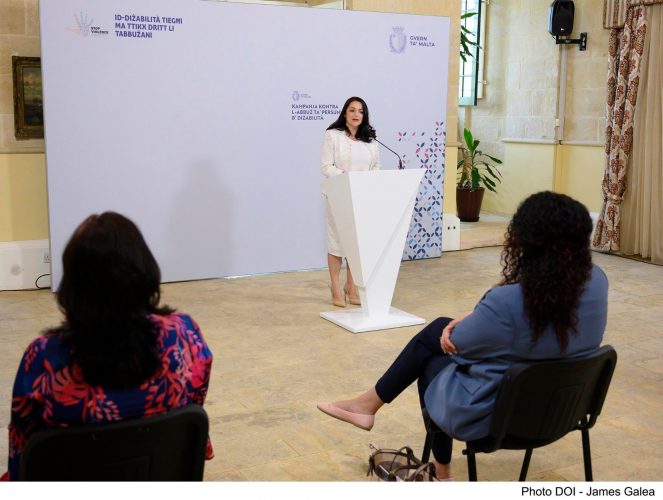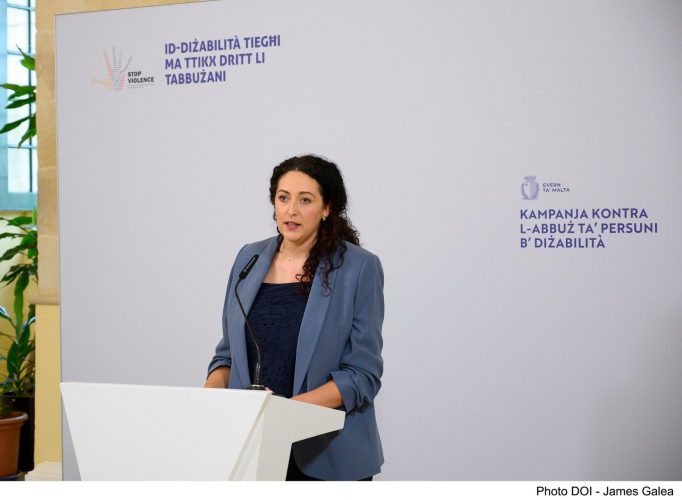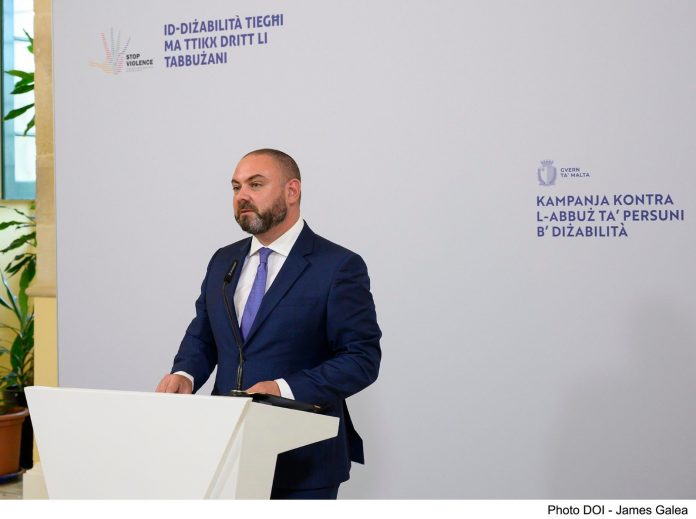Minister for Equality, Research and Innovation Owen Bonnici and Minister for Inclusion and Social Wellbeing Julia Farrugia Portelli launched an awareness campaign about the various forms of violence against persons with disabilities with the theme ‘My disability does not give you the right to abuse me’.
Knowledge and education about abusive and violent behaviour in relationships, as well as about prevention and how one should behave in such situations, are essential in the fight against domestic violence and gender abuse. Therefore, this campaign against violence against persons with disabilities was launched with the aim of raising awareness of the forms of abuse and violence that people living with disabilities may experience. This campaign stresses that a person’s disability never justifies abusive behaviour or violence against them.
Minister for Equality, Research and Innovation Owen Bonnici said that there can never be a justification for the use of violence, and society as a whole should join in delivering this clear message.
“The government is committed to fulfilling its obligation towards the most vulnerable and protecting them from all forms of abuse or violence,” Minister Bonnici said, “and the best weapon we have to help us achieve this goal is to raise awareness and educate society about the various forms of violence. It is crucial to send the message that in a country that wants to move towards full equality for all, no one is more or less than anyone and violence should never be tolerated.”
In her speech, Minister for Inclusion and Social Wellbeing Julia Farrugia Portelli said that the ‘My disability does not give you the right to abuse me’ initiative complements what we prepared legislatively earlier this month, whereby it will be considered an aggravated offence when a person with a disability is humiliated or ridiculed for their disability. The Cabinet of Ministers approved the necessary amendments to the law relating to the Criminal Code while the House of Representatives approved the first reading of this Bill.

Minister Farrugia Portelli said that persons with disabilities are at a higher risk of experiencing forms of physical, psychological, sexual, and economic abuse. “Our laws cater for these abuses by creating schemes whereby people with disabilities find it easier to enter the world of work because work gives dignity to the person and for us a person with a disability is just like and equal to everyone else. That is why we are now launching this form of educational campaign. A campaign aimed at raising awareness about forms of abuse and violence that people with disabilities may experience.”
While encouraging persons with disabilities experiencing violence to come forward and seek help, Commissioner for the Rights of Persons with Disabilities Samantha Pace Gasan stressed the importance of making services providing support for victims of violence accessible. This campaign stresses that a person’s disability never justifies abusive behaviour or violence against that person.

Violence against people with disabilities goes against fundamental human rights and the Istanbul Convention against domestic violence and gender-based violence stresses the prevention of violence against persons with disabilities and protection from abuse and violence.
Stereotypes and stigma over people with disabilities expose these individuals to higher risks of violence. Statistics (UNFPA, 2020) show that this risk increases further if these people have intersectional identities, such as individuals who identify as LGBTIQ+ may experience violence both because of the stigma surrounding their sexual orientation and the stigma surrounding their disability. The same holds for people from diverse ethnic backgrounds, the elderly, and intellectually disabled communities.
Persons with disabilities are at higher risk of experiencing forms of physical, psychological, sexual and economic abuse. In addition, there are forms of abuse that are exclusive to individuals living with a disability, such as when they are deprived of equipment that assists them or the medicine they need or even when they are kept from taking control of their social life and their money. Due to the lack of awareness of these forms of abuse, it would be difficult to recognise the abuse and seek help.










